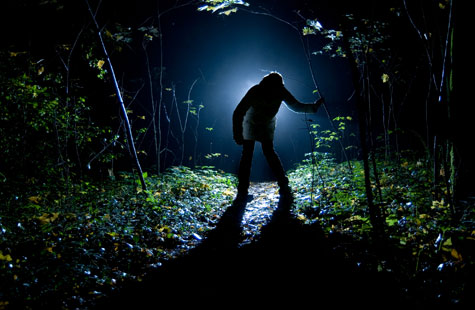So we’re in the midst of the Lent. It’s 40 days of Christian fasting that stretches from the Ash Wednesday to Easter—which is why folks tend to blow it out during the Carnival/Mardi Gras season.
Generally it’s all an act of devotion. You decide to give up something like booze or chocolate for Lent and you stick to it in order to prove something to yourself or God. Aside from the personal shame or God’s displeasure, there’s generally nothing at stake.
Unless you live near the Bayou.
Because according to Cajun folk traditions, the monstrous Rougarou haunts the dark just HOPING to catch the unmistakable stink of someone breaking lent. Described as a a humanoid with the head of a dog or wolf, this liturgical lycanthrope murders stray Catholics during Lent and generally terrifies children into behaving. After all, compared to the fires of Hell; the gut-munching jaws of Rougarou offer a much more immediate threat.
And should you break Lent seven years in a row? Well, then you magically turn INTO Rougarou—or at least transmit the curious form of lycanthropy responsible for the curse. It makes sense from a psychological standpoint: The bestial other-self represents the uncontrollable, base aspects of human nature. It’s why we have bigfoots and werewolves to begin with.
FOR MY PART: This year I find myself giving up fried foods for lent—and since my wife is of Cajun descent, I know I likely fall under the Rougarou’s jurisdiction. There’s a sack of potato chips in my backseat right now and I know I’m toying with disaster by leaving it there.
There’s not much in the way of science to discuss here, but it does cause one to ruminate on negative reinforcement somewhat. What motivation do we need to better ourselves? Health and personal betterment or devotion to a deity? The favors of a loving god or the wrath of a vengeful one? The jaws of Hell or the jaws of a Cajun beastman?
I leave you to decide. Draw blood.
Monster of the Week is a—you guessed it—regular look at the denizens of our monster-haunted world. In some of these, we’ll look at the possible science behind a creature of myth, movie or legend. Other times, we’ll just wax philosophic about the monster’s underlying meaning. After all, the word “monstrosity” originates from the Latin monstrare, which meant to show or illustrate a point.
Originally published at HSW: Monster of the Week: Rougarou the Lenten Werewolf
Robert Lamb is a senior writer at HowStuffWorks.com and co-host of the Stuff to Blow Your Mind podcast and blog. He is also a regular contributor to Discovery News. Follow him on Twitter, Facebook or Tumblr. If you’re into that sort of thing.










